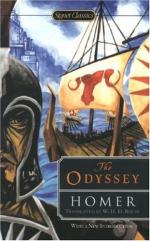“And I said, ’In truth Jove has hated the house of Atreus from first to last in the matter of their women’s counsels. See how many of us fell for Helen’s sake, and now it seems that Clytemnestra hatched mischief against you too during your absence.’
“‘Be sure, therefore,’ continued Agamemnon, ’and not be too friendly even with your own wife. Do not tell her all that you know perfectly well yourself. Tell her a part only, and keep your own counsel about the rest. Not that your wife, Ulysses, is likely to murder you, for Penelope is a very admirable woman, and has an excellent nature. We left her a young bride with an infant at her breast when we set out for Troy. This child no doubt is now grown up happily to man’s estate, {96} and he and his father will have a joyful meeting and embrace one another as it is right they should do, whereas my wicked wife did not even allow me the happiness of looking upon my son, but killed me ere I could do so. Furthermore I say—and lay my saying to your heart—do not tell people when you are bringing your ship to Ithaca, but steal a march upon them, for after all this there is no trusting women. But now tell me, and tell me true, can you give me any news of my son Orestes? Is he in Orchomenus, or at Pylos, or is he at Sparta with Menelaus—for I presume that he is still living.’
“And I said, ’Agamemnon, why do you ask me? I do not know whether your son is alive or dead, and it is not right to talk when one does not know.’
“As we two sat weeping and talking thus sadly with one another the ghost of Achilles came up to us with Patroclus, Antilochus, and Ajax who was the finest and goodliest man of all the Danaans after the son of Peleus. The fleet descendant of Aeacus knew me and spoke piteously, saying, ’Ulysses, noble son of Laertes, what deed of daring will you undertake next, that you venture down to the house of Hades among us silly dead, who are but the ghosts of them that can labour no more?’
“And I said, ’Achilles, son of Peleus, foremost champion of the Achaeans, I came to consult Teiresias, and see if he could advise me about my return home to Ithaca, for I have never yet been able to get near the Achaean land, nor to set foot in my own country, but have been in trouble all the time. As for you, Achilles, no one was ever yet so fortunate as you have been, nor ever will be, for you were adored by all us Argives as long as you were alive, and now that you are here you are a great prince among the dead. Do not, therefore, take it so much to heart even if you are dead.’
“‘Say not a word,’ he answered, ’in death’s favour; I would rather be a paid servant in a poor man’s house and be above ground than king of kings among the dead. But give me news about my son; is he gone to the wars and will he be a great soldier, or is this not so? Tell me also if you have heard anything about my father Peleus—does he still rule among the Myrmidons, or do they show him no respect throughout Hellas and Phthia now that he is old and his limbs fail him? Could I but stand by his side, in the light of day, with the same strength that I had when I killed the bravest of our foes upon the plain of Troy—could I but be as I then was and go even for a short time to my father’s house, any one who tried to do him violence or supersede him would soon rue it.’




